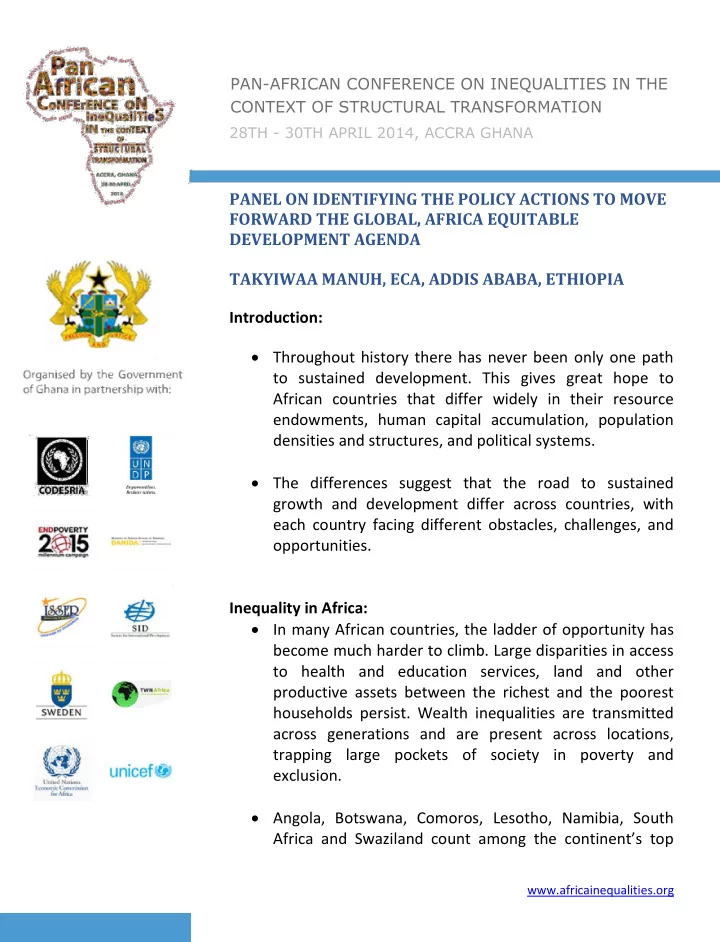

PAN-AFRICAN CONFERENCE ON INEQUALITIES IN THE CONTEXT OF STRUCTURAL TRANSFORMATION 28TH - 30TH APRIL 2014, ACCRA GHANA PANEL ON IDENTIFYING THE POLICY ACTIONS TO MOVE FORWARD THE GLOBAL, AFRICA EQUITABLE DEVELOPMENT AGENDA TAKYIWAA MANUH, ECA, ADDIS ABABA, ETHIOPIA Introduction: Throughout history there has never been only one path to sustained development. This gives great hope to African countries that differ widely in their resource endowments, human capital accumulation, population densities and structures, and political systems. The differences suggest that the road to sustained growth and development differ across countries, with each country facing different obstacles, challenges, and opportunities. Inequality in Africa: In many African countries, the ladder of opportunity has become much harder to climb. Large disparities in access to health and education services, land and other productive assets between the richest and the poorest households persist. Wealth inequalities are transmitted across generations and are present across locations, trapping large pockets of society in poverty and exclusion. Angola, Botswana, Comoros, Lesotho, Namibia, South Africa and Swaziland count among the continent’s top www.africainequalities.org
ten most unequal countries. Slow progress in addressing poverty and inequality and the very nature of economic growth on the continent have created a vicious circle whereby inequality and slowdown in economic growth are mutually reinforcing. The Rio 2012 Summit: The Rio 2012 Summit reaffirmed the need for a world that is just, equitable and inclusive and also the need to work together to promote sustained and inclusive economic growth, social development and environmental protection to benefit all. In this regard, no effort should be spared to realize the internationally agreed development goals including the MDGs, by promoting decent and productive employment and social protection in both formal and informal economies. The AU 2063 Vision: At the continental level, the AU 2063 Vision provides an ambitious and timely context as well as the basis for tackling the equality development agenda in Africa. Indeed, the Common Africa Position on the Post-2015 Development Agenda places a high premium on equitable development as evidenced by the creation of a people-centered development goal, which is anchored – among other things – on the promotion of gender equality and women’s empowerment. In this context, the joint ECA, AUC, AfDB and UNDP Outcome Document of the Regional Consultations on the Post-2015 Development Agenda reaffirmed the need to prioritize equity and social inclusion as well as to pay www.africainequalities.org
attention women, children, youth, the elderly and people living with disabilities and the displaced, in the development agenda. Indeed, this position was strongly reiterated by the ICPD Beyond 2014 Review Summit held in 2014 in Addis Ababa, Ethiopia, which called for inclusive development with a special focus on the youth and women. ECA’s position: The ECA recognizes that there cannot be meaningful development in Africa without addressing the fundamental causes of inequality, such as economic and social power structures in the decision-making processes. For this reason, we fully support the AUC and RECs in their efforts to promote equality and equality in decision- making processes through a number of legal instruments and protocols. However, these instruments need to be translated into national policies. ECA’s objective going forward would be to work closely with member States to achieve Africa’s transforma tion agenda. We will support member States in their efforts to implement growth-oriented macroeconomic policies, and to restore development planning with a view to reduce inequality. As a Commission, we have also devoted our energies to promoting a people-driven social and economic transformation agenda anchored on well-grounded research to influence policy-making processes in Africa. We believe that he/she who has the numbers controls the narrative — in this regard we have invested heavily in the production and collection of credible data/statistics to inform our policy interventions. www.africainequalities.org
ECA also believes that for economic transformation to be meaningful in Africa, member States should accelerate the path of growth, diversify the sources of growth, invest in fiscally sustainable social protection programmes, reduce inequality, and promote decent jobs and rural development. We reiterate the position of the Report of the High-Level Panel of Eminent Persons on the Post-2015 Development Agenda that the new development agenda should be driven by five big, transformative shifts: i) leave no one behind, ii) put sustainable development at the core, iii) transform economies for jobs and inclusive growth, iv) build peace and effective, open and accountable institutions for all, and v) forge a new global partnership based on solidarity, cooperation and mutual accountability. Policy actions to move forward the Africa equitable development agenda Ensuring domestic resource funding for the provision of basic social services, – including access to housing, water, sanitation and electricity. Increasing investment in education and skills development and ensuring that macroeconomic policies support employment creation. Extending the coverage of social protection and decent work standards to informal workers. www.africainequalities.org
Progressive income taxation and highly-redistributive social transfers targeting education and health spending, as well as child- and old-age benefits. Moving beyond goals and targets, to incorporating recommendations on the policy instruments that are required to ensure more equitable opportunities and outcom www.africainequalities.org
Recommend
More recommend